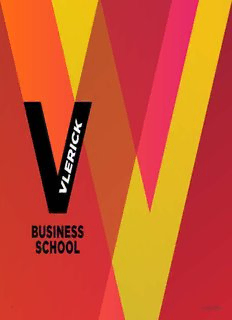
nigel roome - Institute for Managing Sustainability PDF
Preview nigel roome - Institute for Managing Sustainability
1 © Vlerick Business School (c) nigel roome ‘MANAGEMENT FOR SUSTAINABLE DEVELOPMENT AS A SYSTEMS PROBLEM’ ‘SYSTEMIC SUSTAINABILITY MANAGEMENT: COMPLEXITY, RESILIENCE AND SUSTAINABILITY MANAGEMENT’ - VIENNA OCTOBER 7-8 2013 PROFESSOR NIGEL ROOME – PROFESSOR OF GOVERNANCE, CORPORATE RESPONSIBILITY AND SUSTAINABLE DEVELOPMENT - VLERICK BUSINESS SCHOOL A PROVOCATIVE STARTER QUESTION If you came across an ancient city in a jungle and wanted to understand the civilisation that built it would you? A. Search to see if you could find the original design plans and codes somewhere B. Talk with local villagers in the hope of finding someone who knew someone who knew the original designers and residents C. Import your own building materials and build on the foundation and then say ‘well this is what it must have looked like!’ D. Use the word ‘ancient civilisation’ in a grant application so you could go and do what you wanted to do anyway 3 © Vlerick Business School (c) nigel roome The ‘ancient civilisation’ that I want to explore today is ‘sustainable development’ and my approach is to go back to the original thinking and lines of argument behind the concept because they touch directly on the theme of this meeting ‘systemic sustainability management’. I then want to spell out four key aspects of a systems view of sustainable development and finally draw some conclusions 4 © Vlerick Business School (c) nigel roome ARGUMENT – THE PARADIGM Sustainable development was originally conceived as a ‘systems problem’ that required solutions operationalized through a ‘systemic approach’ - this constituted a ‘new paradigm’ for development The paradigm was poorly understood It was displaced by pre-existing non-systemic understandings of development that were extended to sustainable development 5 © Vlerick Business School (c) nigel roome CREATING - PARADOXES More and more practitioners and commentators used the language of sustainability while drawing on old paradigms of development At same time economic and financial globalisation provided resource intensive and consumptive forms of development that reinforced the old paradigm Weak, inadequate responses to the challenge of sustainable development made us think this was the ‘real thing’ when it has not been So during the past 20-5 years we have witnessed increasingly devastating cumulative impacts of human activity on the Planet We begin to wake up to that reality ‘Goals and processes’ of sustainable development remain difficult to understand and elusive to science and practice 6 © Vlerick Business School (c) nigel roome STRUCTURE The original basis for sustainable development Set out to explore four key ideas 1. Systems 2. Systems approach to understanding problems 3. Systems thinking 4. Systemic approach to problem resolution Conclusions and some implications for research, education and practice 7 © Vlerick Business School (c) nigel roome BACK TO THE ORIGINS BASICS – THREE LINES OF THINKING Problem of ‘Complexity’ arising from the interaction of open systems Response - Behaviour Change for Managing for Analysis & Structure Development ‘Systems Science & Cybernetics’ ‘People & teams ’ organisations & ecologies Brundtland Report (1987) The Earth Summit 1992 Agenda 21 (1990-2) 9 © Vlerick Business School (c) nigel roome WHOSE IDEAS WERE INFLUENTIAL? ‘Meta-problems’ (Chevalier & Cartwright 1966) ‘Wicked problems’ (Rittel 1973) ‘Messes’ (Ackoff 1974) Club of Rome (Meadows & Randers 1972) Small is Beautiful (Schumacher 1973) Stockholm Environment Conference (1972) Towards a social ecology World Conservation Strategy (1981) * (Emery & Trist 1972) Referent organizations (Trist 1983) * Behind this - Bateson, Boulding, Agenda 21 (Jim MacNeill & David Runnalls Ashby, Beer, Bertalanffy, Vickers, 1990-2) Checkland, Ackoff etc Earth Summit 1992 run as a ‘search conference’ – Emery & Trist 1st search conference run in 1959 10 © Vlerick Business School (c) nigel roome
Description: